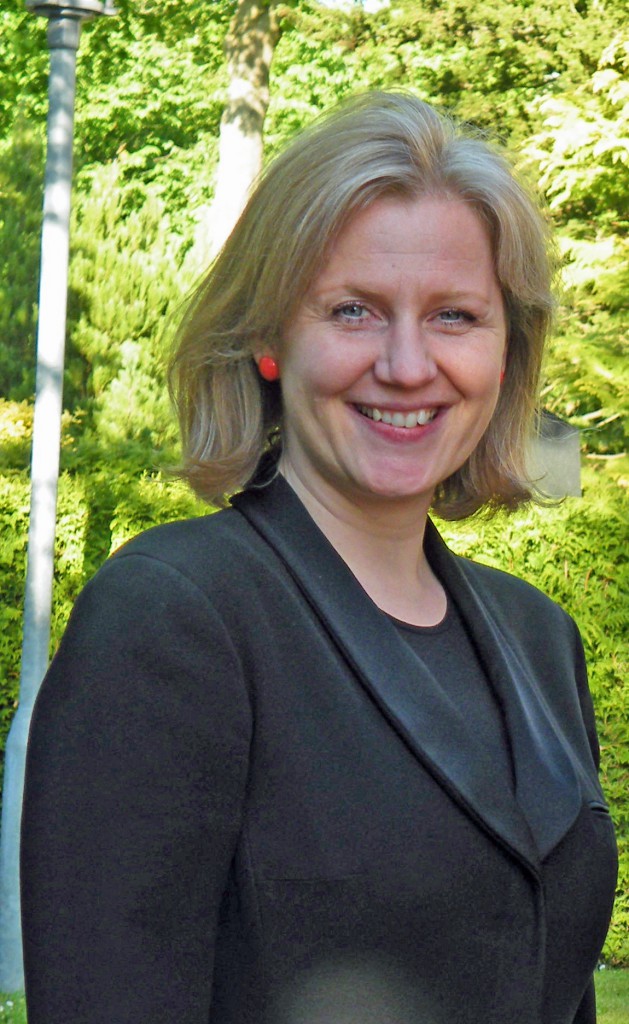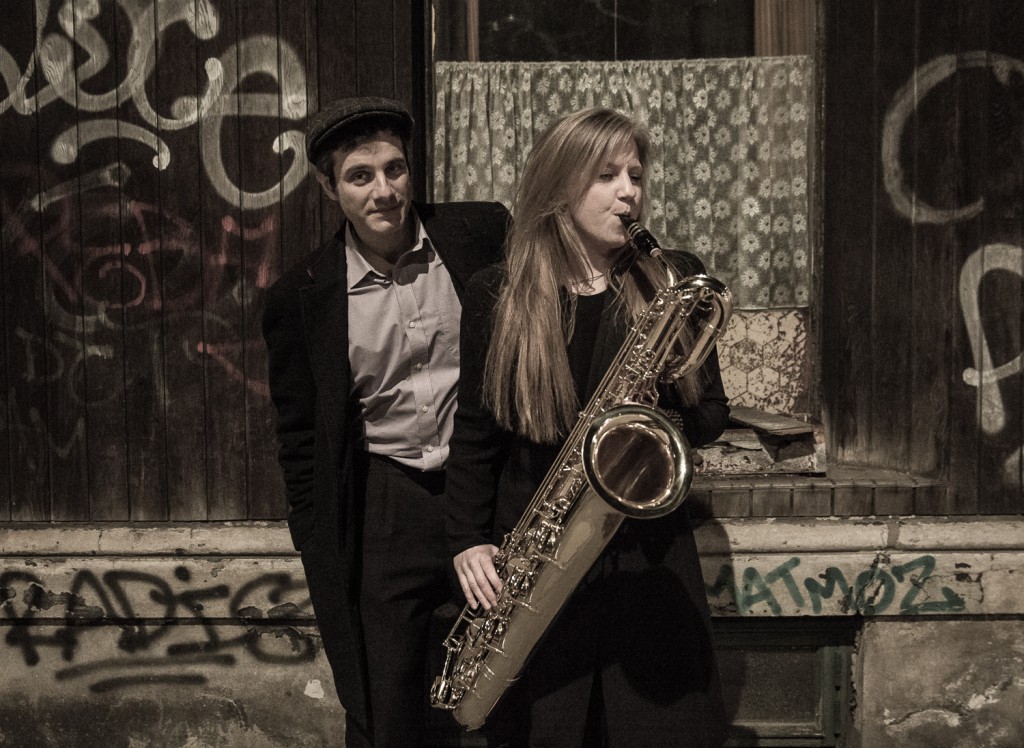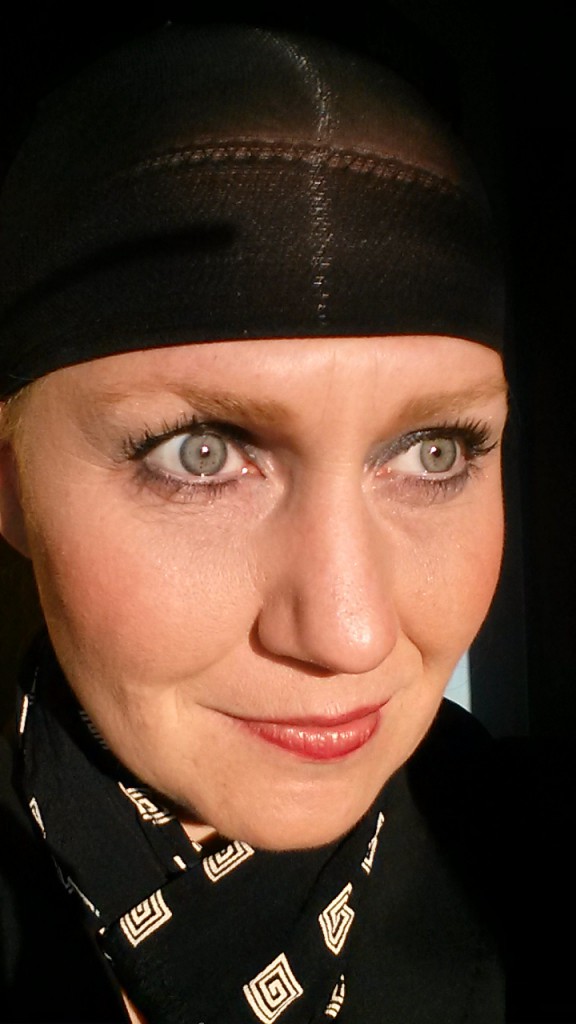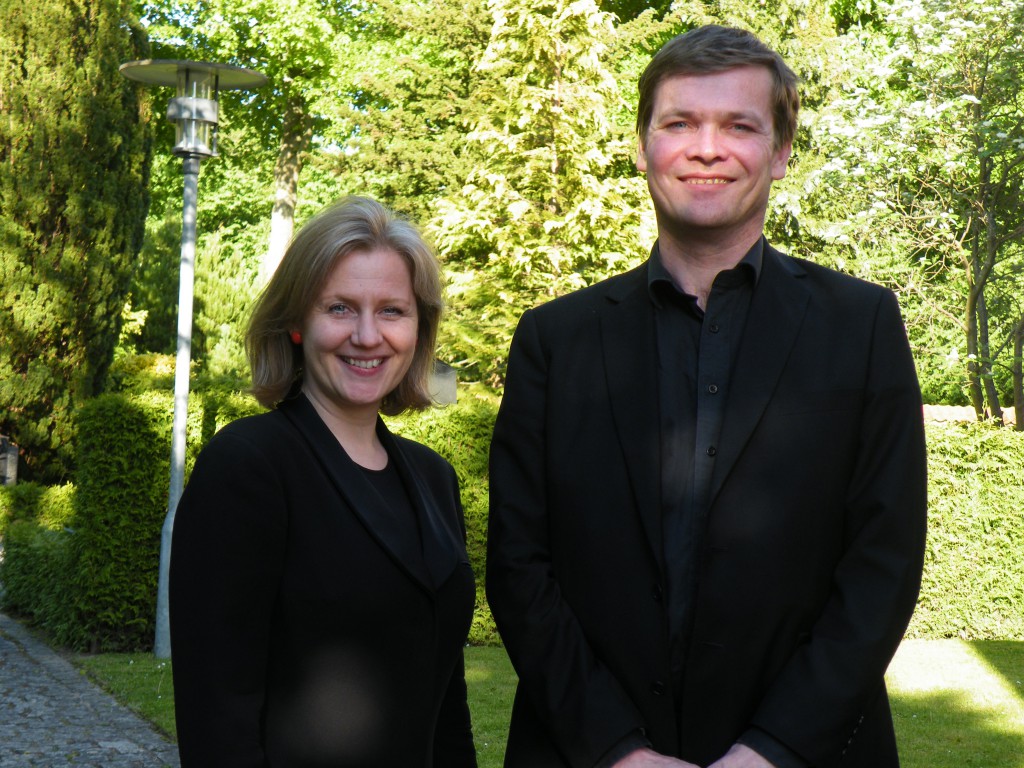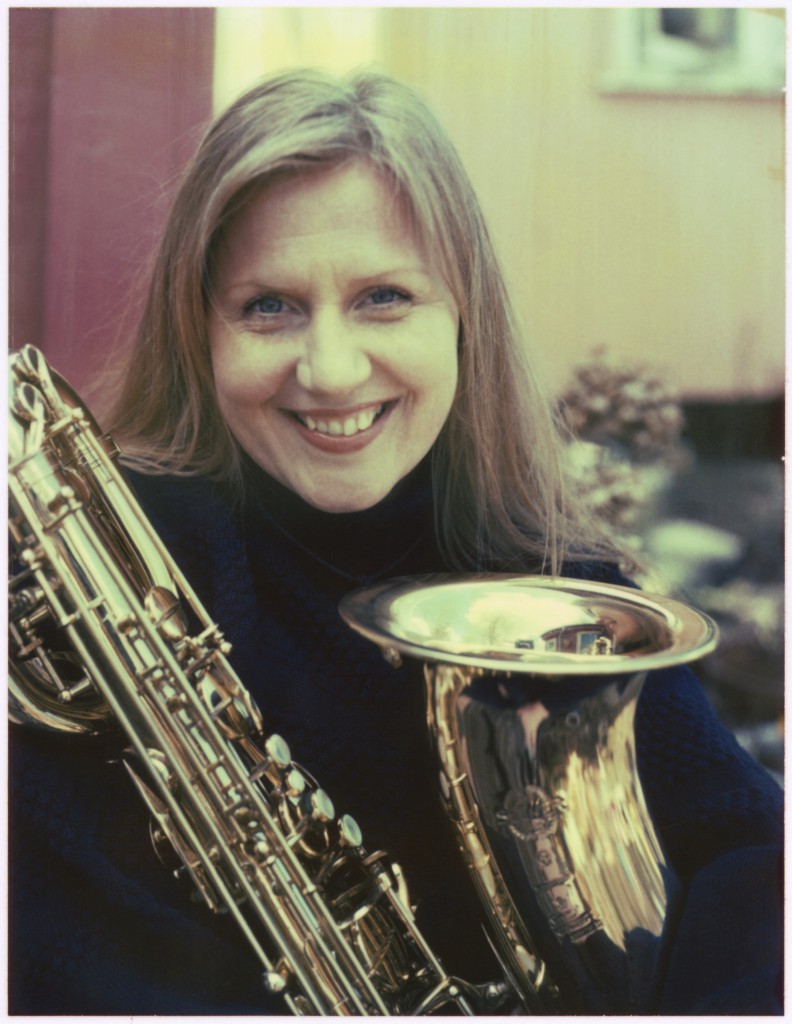Charlotte Andersson
Saxophone, Singing and Organ
Interview: Composer Leif Martinussen
Editor: Nete Parkov
Charlotte Andersson is a musician with a broad reach. She is educated with saxophone and song from The Royal Danish Conservatory and since then she has taken advanced studies in the same disciplines. Later, she supplemented with an organist exam from the Church Music School of Zealand. She is a member of a saxophone ensemble, she is part of several duo constellations, she is a member of a theater company, she plays with the Royal Chapel and the Royal Guard, and she plays with Danish, Swedish and German symphony orchestras. She has been a band leader in the Malmø Opera, she performs folk music and folk songs, she performs as a soloist at Lied concerts and choral works. She is employed as an organist at Herstedvester Church and Kong Haakons Church, the Norwegian Seamen’s Church in Copenhagen. She plays with the inmates of the prison Anstalten ved Herstedvester. She has been assistant manager of the Royal Danish Conservatory’s Big Band and taught at the multicultural Goldschmidts Akademi in Copenhagen. In addition to all this she is a member of the artistic committee of Danish Federation of Musicians.
Her high activity and capacity for work inspires me to ask her my first question:
- Charlotte, when and how do you relax?
”The Sea means a lot to me”, she answers,”I grew up with it. Me and my family have always lived by the sea, and I myself do so today. I can be sitting for half a day and just look at the water. It has an impact on my soul, the same influence that I can get by looking at a painting. Senses, colors and shapes changing, contours moving – this is important to me, whether it is music, artist or nature. Everything is connected, in my opinion. It’s just about opening your senses.
But out on the Sea – that’s where I really feel good. I have always sailed and fished with my father, and at the sea I find all the way to peace, even though there are many practical tasks when you’re sailing. Afterwards when I go ashore, I am refreshed and full of energy, and I have got a lot of inspiration.
When sailing together with others – and I regularly sail along with 4 other women – we have an agreement, that one brings an adventure, one has a song and one brings some food. You are also allowed to invite guests with you. But from the moment you walk aboard you have a duty to carry out a social mission, what ever appears! This interaction is important to me. It gives a lot of inspiration which I carry on. The inspiration might be an energy, that fills up my mind – light – something, that wakes me up. And afterwards, when I sit down at an instrument, I just have to open the floodgates and see what happens.
I sail a lot, but I also walk a lot – at least 20 km at a time. I do it very often. I never jog, ‘cause I don’t like it. But when I walk, I see a lot of things, beautiful trees, birds, buildings, sculptures, anything that inspires me. It is really good, it renews your air and sharpens your thoughts.”
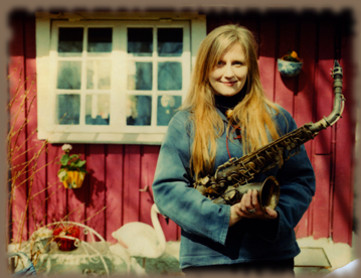
- So you never feel stressed?
”O, yes – but I get processed those of my thoughts that have been unresolved due to lack of time while I usually rush from one place to another. When I’m walking and sailing, things are wrought by the wind in my head.”
- How and when did you meet music?
”I always knew that I wanted to play music. Since I can remember, music and rhythm was a part of my life. As a child I was a competition dancer. And I still dance when I’m alone. If I have something in the body to be out – if I’m very happy or angry – I can well find myself dancing in my livingroom. All alone! Yes, I always knew that I was going to play music. I don’t know where it comes from – I have no idea. Nobody else in my family is playing. As a child I pestered my parents to be allowed to play, but I was not allowed before I was 14 years old.”
- There were no music in your home?
”Oh yes, we listened a lot. My whole family love music. My parents played music when they were young but stopped again in a young age. And we didn’t just turned on the radio, it was something you put into words. We were discussing the music we heard, and we also sang along. I was engaged in listening to ”The Magic Flute”, Glenn Miller, Osvald Helmuth …. We listened to the ”Queen of the Night” and ”Händel’s Messias”. We discussed what it was, and what it meant to us.”
- But some day this is not enough?
”I pestered my parents, and every time we visited people, who had an instrument, I tried to play it. My friend had a grand piano, and I played a lot in her home and found melodies without knowing, what I was doing. Eventually my parents got enough of watching me, and then they allowed me to try. And the only available instrument at the music school, was saxophone. Therefore, this was the instrument that was put in my hand.
I went to music school in Elsinore, and my teacher sent me to the summer courses for saxophonists with masterclasses in Ingesund Musikhögskola in Sweden, because he sensed I wanted something more with my playing. And he was certainly right. I had only just turned 15 and met in master classes with people much older than myself. Adult music students from all over Europe – they should be my fellow students. There were no Danes. But I speak some Swedish, so I did well. We started with a large ensemble Group to get to know each other. In fact I didn’t have much knowledge, I had only played for half a year. I hardly knew the meaning of a scale. But I always had a strong will. Is there anything I want to learn, I give it 500% – and this is it! And then I fell in love with the sound of the instrument, because it was so very inspiring to hear the others play. From that point it was pure love to the instrument. And after a week I could play the Circle of fifths, I could read music and I played saxophone quartet with others. So even though it could have been any instrument, so it became the saxophone. Today I have so much experience that I feel it inside my body when I hear other saxophonists . I don’t know if I have very good hearing, but when it is the saxophone I know at once what tone is played, because I recognize the vibration. It is wonderful.”
- I know. The tunes of the instruments have their own identity. And the saxophone is a big family. How many of these do you play?
”Today I usually play soprano saxophone and baritone saxophone – those I prefer. But I also take jobs on tenor- as well as on alto saxophone. I have even tried the bass saxophone, but it is so heavy lifting, that I cannot do it alone. That’s why I haven’t played it so much. But you can easily switch between the various types of the instrument.”
- Why do you speak Swedish?
”I grew up in Elsinore – right next to Helsingborg. In the 80s , when I was a kid , there were many Swedes. We heard and spoke Swedish every day.”
- In addition to the saxophone , you also have other high-level areas that you work with?
” I studied singing and saxophone at the same time at the academy. Actually, I had not been trained in singing before I started . But I thought ” Why not – if you do not ask, you will never know .” So I asked if I might have two main subjects. And it was possible if you went to the audition on equal terms as everyone else. I was lucky to pass, and then I got classically trained, as they say. Among others I sang a lot of opera. I do like opera and I do sing it today, but not very often. I mentally moved a great deal. I love to sing folk music and folk songs now. Actually opera never interested me so much, but it has given me a great understanding of the use of the voice. How it relates to the whole body function, when you sing. I luckily had a great teacher, Hanne Stavad. She focused a lot on the body in her teaching. She also teaches Alexander Technique, and she made me understand, how everything is connected. All is not collected in the head. Her dissemination made me very conscious of this fact. I also use it playing saxophone, ’cause it’s pure logic that a melodic line has to be sung out with your instrument – if it is a trumpet, a saxophone – or if you are singing, it doesn’t matter. It can all be combined with breathing use. It’s a smart mix, I think.”
- Your third subject – the organ – why did you choose that?
”Since I was 15 years I have worked as a church singer. Sthens Church in Elsinore – here I sang for many years. I always admired the organ, when Oddmund Opsjön were playing. This instrument has unlimited possibilities – variations in sound – you can accompany – you can be a full symphony orchestra or a delicate solo voice. I love this instrument, I always dreamed about it, but I always thought it might be too difficult. My good childhood friend Morten has said to me through several years: Get started! No, I dared not. But then one day few years ago I ended up in a life situation where I had made up everything difficult, and I knew everything had to change. So I jumped from the 100 meter diving board and went to enter the church music school. I think I had two lessons with Mads Damlund in Jægersborg Church and had rehearsed some works that could show what I could perform and not perform. And so they had to say yes or no.
I was lucky enough to be admitted to the school, and I got a fantastic teacher, Søren Johannsen from Christians Church. He is incredibly talented, and I am sure I was a terrible student. I was very busy playing the saxophone and busy with my concert performances. I did not always have the time to practice what he had asked me to. But he knew how to seize the situation and push my development from any point each time. At that time I had a full time employment as an organist, even though I didn’t at all master the organ. He shared the lesson in two parts, some of it was used to prepare my High Mass each coming Sunday, and the rest of the time was used to prepare me for my examination. He was very good at identifying the immediate needs. He also accepted, that I didn’t see myself as a very traditional organist.”
- He knew you shouldn’t be a conformist but free to develop yourself from your current situation?
”Yes, we are all indeed very different, and I am deeply greatful that it was he who was my teacher. He is a very busy and a highly respected musician making a lot of different projects in sublime ways. Therefore he could understand my situation, when there had been one project or another – so I couldn’t concentrate of talking about exact this coral. So we talked about other climes at just that moment. And that’s how you still got moved and got some inspiration. In stead of being scolded.”
- You play in many contexts and constellations. Could you give me at little vue over them?
”Indeed. I play the baritone saxophone in an ensemble called Copenhagen Saxophone Quartet. We play alone a lot, but we also play many projects together with soloists. It might be from all areas of art – classical musicians and jazz musicians – there have been authors and ballet dancers – what ever. This is very exciting, extensive and varied.
I also sing with the jazz guitarist Jacob Fischer, songs and Swedish folk music. This is a quite other genre to perform, because you are very close to your audience. You convey some text , you have contact at once, and I like this very much. And especially that Jacob is jazz musician makes him relate freely. Musical arrangements you may well do, but you don’t know whether it could be today that something else will happen, because he has got an inspiration. There must be place for this to be and then I’ll be moving too.”
- Jacob Fischer is a great musician, playing so superior and flexible, I have heard you performing together. And when you are a duo, you almost have to breathe synchronously. It might be nice to be surprised sometimes?
”He can draw me out of my comfort zone, I kan tell you. And I really do feel our synchronous breathing. He has my back. Whatever I might do, I know he’s there. It’s not necessary to turn around, questioning ….. ”Did you notice, I forgot a verse? It was not on purpose!” I don’t have to, because he already knows. And that very direct connection I feel so very great.
Furthermore, I play with a film composer who is also a klezmer singer, Ronen Thalmay, a jewish musician. We both play piano, we both sing, and I play the saxophone. When we are out performing together, we switch roles all the time. Either we play together or accompany each other.
We sing in Yiddish, we play klezmer, we play Swedish and Norwegian folk music, and we tell about our generations of history – linking it to the music. My father’s family are Swedish immigrants. They lived in Dalarna and could not get work during the great famine, so they went away – 7 brothers. They actually wanted to go to the US, but they only reached Denmark. 5 of them returned shortly after to Sweden, but two of the brothers stayed in Denmark.
This cooperation is very nice and funny. I also learn a lot from playing Ronen’s music.
Very often I play with symphony orchestras and theaters . Right now, I play at the Royal Theatre, performing a chamber opera called “Powder her Face”. We are a chamber orchestra accompanying a few singers to newly written music by Thomas Adès . It is awfully demanding – a huge challenge. I really like being a part of theatrical life, because it is a very intense cooperation we have with the people you are working with.”
- You like to be where there will be a challenge that you must take?
“That’s what I like. I should be out of my comfort zone. Though I ‘m always a little scared and nervous, I still prefer it that way.”
- You always gets a little better by being nervous and just before reaching your limit?
”That’s where you senses are sharpened, I feel. That’s where I just should achieve something more. When I have gone through it, then I have been moved. And then I might be better the next time – or I ‘ve got some impressions from other people.
Some years ago I was asked if I would join a small opera company. I just had to play saxophone. But the one of the roles was suddenly vacant. There were only 2 singers and 3 roles. And I jumped in and sang the role as Pamina in The magic Flute. Another day the lead was unable to meet, and suddenly I found myself singing Queen of the Night – transposed a terz down, because sometimes we sing at 8 o’clock in the morning. For children.
Suddenly you should therefore also make plays. And there throwing yourself on the floor and pretend to have been captured – that exceeded my limits! And it was anxiety provoking the first time. I thought: What if the audience does not accept what I do? I’m not an actor. But it’s just like improvising. We do not know what will show, and you have no idea whether people want to hear what comes out. But you have to tell yourself: This is my honest bid. This is what I am right now! Without any safety net. In fact I think it will not be interesting to listen to if there are too many safety belts and safety nets.”
- Several times I was a Judge at music competitions abroad. And the most important thing to me was every time to sense whether there was a personality of the musician. Does the musician dare taking risks and give music a personal expression? That’s where you promote music from being only notes on paper.”
“It is certainly my experience too. As mentioned – the inspiration can be feelings that you can use when playing . Especially regarding to singing – if you sing a ballad about a rejected woman or something – then you can draw on your own experience. You do not have to tell the audience about your love life and your experiences into that realm, but you might think: How did I feel when he was so cruel to me? There, you feel vulnerable. But you ‘ll have to do it. Otherwise nobody wants to listen to you.”
This is what art is about – love. And when you reach a certain age you begin to understand why people want to hear songs. I didn’t understand it, when I was younger, I did not find it interesting. But now that I have had some experiences of different kinds in my own life I can identify with it. And you have to take it exactly as seriously as you take an opera aria or anything else. I think the song is very demanding to convey.
It’s all about communication . Every time you make a program , then you disseminate, but depending on what type of concert and what kind of a place. If our saxophone quartet plays Corelli and Scarlatti, we don’t change the program, of course. But if Jacob and I are out – or Ronen and I – and if we feel that the audience is in a different mood than we thought, then we might change something. And are we feeling that here we have something together, then we will try to continue it. This is intuition. And this I use a lot. I also allow myself to use it at church services when I play as an organist.”
- What do you think about musical life today? You know, the economy is tightening, intervention is minimized, and one may feel the assessments are too subjective. How do you feel this barometer is in Denmark today?
” I have no doubt that life is much more difficult for musicians – including the very talented ones – simply to get the activity you want. I mean – where the income is. You can always go and play somewhere, but if we are to survive financially – this is much more difficult now than it was just 5 years ago. Private jobs and concerts – they all cut down . When the ensemble contacts churches you will experience that they are cutting and moving the amounts because they might rather spend the money on areas other than music. Even music associations who love music and prioritize it – that’s what they are meant to do – they use less money. The audience is smaller, this makes me actually really sad. I’m happy they exist, but I notice how they play safe. They engage the names that attracts the audience for sure. Playing safe might slow the progression of the Danish music scene. This is a great danger .”
- I know the churches turned down the appropriations. And I think approach to music schools is weakened.”
” Yes, even though the children who do not have the experience of knowing music in advance, they respond positively when there are some living people playing towards them – whatever it might be. When we play Mozart on schools we only meet joy. Before we begin, they might think that opera is some terrible screaming – it surely must be boring. But they are singing, rejoicing, laughing of the action. And you can hear them whistle the themes when they walk away. They are also allowed to get up and touch the instruments and the costumes . The live music is really important.
I have taught for many years. It’s quite a while ago , but I remember that especially the singing students came with great enthusiasm and an expectation that they could learn to sing like their idols in no time. But I had to explain that course should be practiced – and practiced every day. It’s just like a marathon – you cannot run it without training your muscles – it’s the same with singing. Then they often lost interest . And it is not because children cannot or will not – it’s because they also have to practice football – or karate – everything else during the week. So they were stressed. They were not used to spending time to indulge in anything.”
- And how do you identify the potential opportunities of a child? How can you know?
”Someone has to come from outside and touch them. In Herstedvester Church we have many confirmand students, and we sing with them. Not just a hymn now and then, no, we give them singing lessons – voice training – and review what the text is about. And when you look across the group, it might be the one that you would not expect that is singing loud and clear. You never know. But you have to grab it. To give the guy at 13 with the cap the challenge: Don’t you want to come on Sunday and sing along ? And should he like to, it’s important to nurse his development. Because he might not get the opportunity from elsewhere.”
- When you think ahead, do you have some special visions? Is there anything in which you need to immerse yourself?
” Yes, I have always been quite diligent in setting goals. Currently I take lessons in improvising with a jazz hammond organist called Kjeld Lauritzen – a very talented musician. I want to be a good improviser, and I am not – I feel like a first year music school student in this discipline. But it’s my next goal. Because I would then play more freely – whether it’s saxophone or organ or singing – I love the free universe.”
- I played much jazz in my younger days. In the classical world you have to be 100 % correct and in order. I understand you are fascinated by the feeling of freedom.
” Yes, both your own freedom – but also the communication you have with others who improvises . If you play with someone – because it is without words – then you should have that tele- communication, I almost said. And I really like when we succeed .”
- Did you play jazz on your sax?
” I’ve played a lot with big bands, but I have not really improvised. I do it in baroque music and folk – it comes naturally. So where am I going? Improvising is certainly something I want to use more.
I often play in a duo as a saxophonist together with organ – and this is pure classical, scheduled – reading the scores. This I would like to change a little – the style and the concert form, making it more fluently, improvising from baroque music into something folk. Together with a church organ – I would like that. The organ has the opportunity with registers – generating altered sounds – other vibrations – and so I have to do something like it on my saxophone. This flexibility I really like. If we have travelled we usually arrive 1-2 days before we have to play the concert, not to practice our program so much, but to know the instrument so we can make a proper bid – to adjust to the room, acoustics – I would like my saxophone to merge with the other instrument. To be allowed to spend such time, this is a privilege, I think.”
- I think you are very much alive and eager to be observant . You also work in a prison, do I know?
”I have the pleasure to come in the prison Anstalten ved Herstedvester, where my colleague Jeppe Rønnow is organist. I have helped to sing and play with a church choir of prisoners who like to sing. They meet twice a week, they practice for the mass where they sing for the other inmates. The process you are doing with them varies widely depending on how the day’s form is by yourself, but also by the inmates . But I can tell you, they love to sing. It does something for them as it does for all of us. There may be some energy to be out of the body . There may be a need to come out with something constructive that they get covered, just as you do. And if just a little bit can help to make the people’s future life just a little easier, so that they get better conditions to move forward, then I will be really happy. They get a lot of training and treatment and other things, but I believe that music can help them too. Sometimes you can be lucky to get such challenges, where you feel there may be a purpose. And I have also seen beyond the purely practical fact that we are playing, there are many people in society who have questions about how to operate in a prison, why they are there, how they feel, what needs do they have? What do they get by society? And I think it’s good to feel that you can actually contribute a little bit of information about it, for it is needed.
I do not find that it is enough as a musician to just stand up saying: Now I play a really nice song, and then I have done something, because those who listen will hopefully be happy . No, I think it’s not enough. You can’t tell what is right for others, but for me it is right to engage me in something socially conscious, something that also has something society beneficial in itself. And I can not do anything that procures big money to society or change anything politically. But one little corner I can contribute to touch, and if there is something that captivates and can make anything flow, so I would like to help doing it. When you have been lucky enough to get some privileges from home – a surplus, something useful, then I think we have a duty to pass it on as well as you can and as your energy allows in the fields of interest, you have.”
Copyright: Editshop.dk

